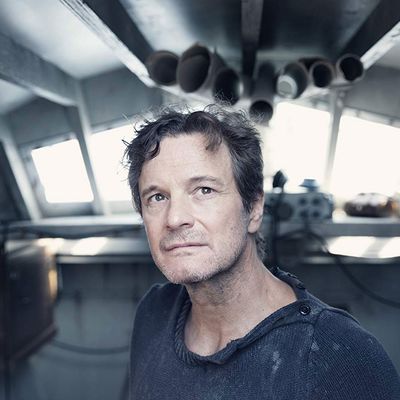
For all the justifiable awards and acclaim Colin Firth has received over the years, it’s the rare film that manages to use that expressive face of his to its full potential. Yes, he’s very good at playing genteel types who are uncomfortable with showing too much emotion, but for all his expert subtlety, he can go big as well. Seen in that light, James Marsh’s melancholy seafaring drama The Mercy sometimes feels like it was made specifically to right this wrong. Much of it consists of Colin Firth, alone on a boat, suffering the tortures of the damned — both physically and spiritually.
The actor plays Donald Crowhurst, a struggling inventor and dreamer from the picturesque English seaside town of Teignmouth who in 1968 entered a Sunday Times–sponsored yacht race to circumnavigate the globe without stopping. We first see him as an affable, not-too-slick salesman, promoting some newfangled marine navigation equipment he’s designed. When he hears of the race, he realizes that the publicity might help his flagging business. He’s also convinced that by building his own lightweight, high-speed trimaran, he’ll be able to zip past his rivals. Of course, most of the other contestants are seasoned sailors, while Crowhurst is an amateur who basically just does weekend cruises with his wife Clare (Rachel Weisz) and children.
But that’s also partly why he wants to enter the race: “What have I done in all these years?” he asks Clare, wanly. “I don’t want to make devices that allow others to go off and have all the remaining adventures.” The fact that he’s a nobody competing against somebodies is obviously a selling point for his endeavor — he’s a classic underdog — but there’s an underlying melancholy to this man’s personal motivations as well. He doesn’t just want to show up the somebodies; he wants to try and finally become one, before it’s too late.
Do me a favor. Please do not look up what happened to Donald Crowhurst before you see this film. What makes The Mercy work — when it works — is tracing the journey of doubt and pain on Firth’s face as his ostensibly heroic expedition starts to go south early on. Once he’s at sea, the movie becomes a grand showcase for the actor’s range, as Crowhurst’s confidence turns to silent desperation, and eventually to a kind of rambling, stream-of-consciousness dialogue with himself about … well, that’s all I’m going to say about the plot. Meanwhile, back at home, Clare hangs on for any bit of news she can get. This is as much her story as it is his, and Weisz is terrific as a woman in the midst of an endurance test of her own.
All that said, you might also find it impossible not to look up what happened to Donald Crowhurst after you see this film because Marsh, working from a script by Scott Z. Burns (The Informant!, Contagion), often fails to clarify just what exactly is going on with the man and his boat, relying a few too many times on montages that, while occasionally stirring, leave us hanging information-wise. Especially since the details of what Crowhurst actually did and did not do are a fairly significant part of the story, and directly affect his emotional state at any given point.
This is, of course, the storytelling challenge with such endurance tales, which carry us along on their characters’ psychic journeys but also need a fairly solid grounding in the mechanics of the ordeal — what’s broken and when, what’s working and how, what hurts and why — in order not to come off as a series of vague, hand-waving tribulations. Which is all just a fancy way of saying that I walked away from this picture both moved and confused. Because it’s got Colin Firth and Rachel Weisz in top form, The Mercy nails the emotion, but comes up somewhat short as a narrative.


